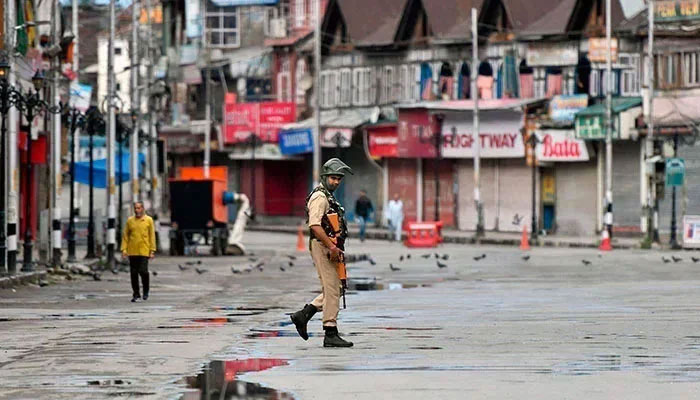Internationalising Kashmir
Threat of two nuclear powers spiraling into open war has finally forced world to take note
For more than seven decades, the people of Indian Illegally Occupied Jammu and Kashmir (IIOJK) have endured repression, erasure and systemic violence. Yet their struggle for self-determination remains one of the most under-reported human rights tragedies of our time, ignored by a world increasingly driven by economic interests and strategic alliances. That may now be beginning to change. US President Donald Trump’s recent remarks on Kashmir, following his earlier announcement about a ceasefire agreement between India and Pakistan, have once again catapulted the issue onto the international stage. Trump’s statement has pierced through a diplomatic silence that had shrouded the region since August 5, 2019 when the Modi-led Indian government unilaterally revoked Article 370 of its constitution, stripping Kashmir of its special status and effectively nullifying its autonomous standing under international law. This revocation was a clear message to the Kashmiri people: their identity, land and political future could be redefined without their consent. It allowed for the influx of settlers from other parts of India into IIOJK, a demographic engineering project that Kashmiris rightly fear is designed to turn the Muslim-majority region into a Hindu-dominated one. India’s Supreme Court later rubber-stamped this unconstitutional act, leaving Kashmiris with little recourse within the Indian state. Since then, the situation in IIOJK has only worsened. Journalists, human rights defenders and political leaders have been arbitrarily detained as internet and communication blackouts have silenced the voices of the oppressed.
The myth of ‘normalcy’ the Modi government has desperately tried to sell to the international community was brutally shattered with the Pahalgam attack. India, true to form, blamed Pakistan without evidence and responded with military aggression to deflect from its own failures in the occupied territory. In this context, Trump’s re-hyphenation of India and Pakistan is significant, reaffirming that Kashmir is not India’s 'internal matter', as Modi’s government often claims, but a disputed territory recognised as such by numerous UN resolutions and bilateral agreements. Trump’s balanced tone and simultaneous trade overtures to both nations have further rattled the Indian establishment. That rattling has turned into outrage within India’s hyper-nationalist media, which has long thrived on chest-thumping and disinformation.
India’s anger stems from the reality it has tried hard to suppress: the world is watching, and it no longer buys into the illusion of peace in Kashmir. Pakistan’s principled stance – offering to talk on all issues, including Occupied Kashmir – now stands in stark contrast to India's intransigence and belligerence. Modi’s aggressive posturing is now a global issue. The threat of two nuclear powers spiraling into open war has finally forced the world to take note. Trump’s mention of Kashmir may be politically motivated – as many of his statements are – but to the people of Kashmir, it offers a glimmer of hope that the international community might finally begin to hear their voices. The world must now amplify those voices. For too long, global powers have coddled India as a counterweight to China, ignoring the costs borne by Kashmiris and Indian minorities in the process. But strategic partnerships must not come at the expense of human rights, dignity and the right to self-determination. It is time for serious, sustained, meaningful international engagement in Kashmir. The people of IIOJK have waited far too long.
-
 Czech Republic Supports Social Media Ban For Under-15
Czech Republic Supports Social Media Ban For Under-15 -
 Prince William Ready To End 'shielding' Of ‘disgraced’ Andrew Amid Epstein Scandal
Prince William Ready To End 'shielding' Of ‘disgraced’ Andrew Amid Epstein Scandal -
 Chris Hemsworth Hailed By Halle Berry For Sweet Gesture
Chris Hemsworth Hailed By Halle Berry For Sweet Gesture -
 Blac Chyna Reveals Her New Approach To Love, Healing After Recent Heartbreak
Blac Chyna Reveals Her New Approach To Love, Healing After Recent Heartbreak -
 Royal Family's Approach To Deal With Andrew Finally Revealed
Royal Family's Approach To Deal With Andrew Finally Revealed -
 Super Bowl Weekend Deals Blow To 'Melania' Documentary's Box Office
Super Bowl Weekend Deals Blow To 'Melania' Documentary's Box Office -
 Meghan Markle Shares Glitzy Clips From Fifteen Percent Pledge Gala
Meghan Markle Shares Glitzy Clips From Fifteen Percent Pledge Gala -
 Melissa Jon Hart Explains Rare Reason Behind Not Revisting Old Roles
Melissa Jon Hart Explains Rare Reason Behind Not Revisting Old Roles -
 Meghan Markle Eyeing On ‘Queen’ As Ultimate Goal
Meghan Markle Eyeing On ‘Queen’ As Ultimate Goal -
 Japan Elects Takaichi As First Woman Prime Minister After Sweeping Vote
Japan Elects Takaichi As First Woman Prime Minister After Sweeping Vote -
 Kate Middleton Insists She Would Never Undermine Queen Camilla
Kate Middleton Insists She Would Never Undermine Queen Camilla -
 King Charles 'terrified' Andrew's Scandal Will End His Reign
King Charles 'terrified' Andrew's Scandal Will End His Reign -
 Winter Olympics 2026: Lindsey Vonn’s Olympic Comeback Ends In Devastating Downhill Crash
Winter Olympics 2026: Lindsey Vonn’s Olympic Comeback Ends In Devastating Downhill Crash -
 Adrien Brody Opens Up About His Football Fandom Amid '2026 Super Bowl'
Adrien Brody Opens Up About His Football Fandom Amid '2026 Super Bowl' -
 Barbra Streisand's Obsession With Cloning Revealed
Barbra Streisand's Obsession With Cloning Revealed -
 What Did Olivia Colman Tell Her Husband About Her Gender?
What Did Olivia Colman Tell Her Husband About Her Gender?




